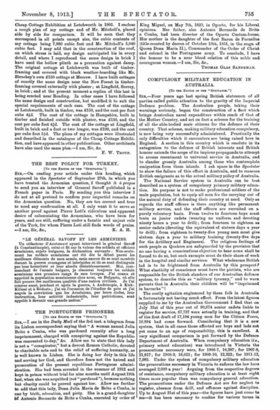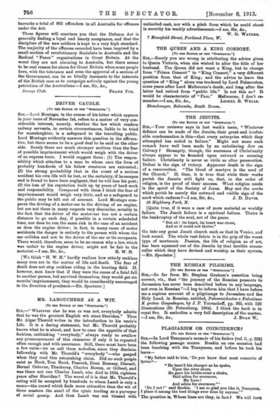COMPULSORY MILITARY EDUCATION IN AUSTRALIA.
[To THE EDITOR OF THE " SPECTATOR."1
SIR,—Four years ago last spring British statesmen of all parties called public attention to the gravity of the Imperial Defence problem. The Australian people, taking their warnings seriously, began the construction of a fleet which brings Australian naval expenditure within reach of that of the Mother Country, and set on foot a scheme for the training of all the able-bodied male citizens for the defence of their country. That scheme, making military education compulsory, is now being very successfully administered. Practically the only difficulties which it encounters are being raised here in England. A section in this country which is resolute in its antagonism to the defence of British interests and British honour extends the scope of its impious propaganda to attempt to arouse resentment to universal service in Australia, and to slander grossly Australia among those who contemplate emigration from these islands. I ask space in the Spectator to show the failure of this effort in Australia, and to reassure British emigrants as to the actual military policy of Australia.
TheNational Service system in Australia can be best described as a system of compulsory primary military education. Its purpose is not to make professional soldiers of the male population, but to equip all men for the carrying out of the natural duty of defending their country at need. Only as regards the staff officers is there anything like permanent military service, and the staff officers are recruited on a purely voluntary basis. From twelve to fourteen boys must train as junior cadets (wearing no uniform and devoting ninety hours a year to drill) ; from fourteen to eighteen as senior cadets (devoting the equivalent of sixteen days a year to drill); from eighteen to twenty-five young men must give sixteen days a year to military training (twenty-five days for the Artillery and Engineers). The religious feelings of such people as Quakers are safeguarded by the provision that no one having a conscientious objection to bear arms shall be forced to do so, but such exempts must do their share of work in the hospital and similar services. What wholesome British lad is to be frightened from Australia by this prospect? What elasticity of conscience must have the pietists, who are responsible for the British slanders of our Australian defence system, to describe this as "military tyranny," and to warn parents that in Australia their children will be "imprisoned in barracks "! The costly agitation engineered by these folk in Australia is fortunately not having much effect. From the latest figures supplied to me by the Australian Government I find that on July 31st of this year out of 90,674 senior cadets liable to register for service, 87,737 were actually in training, and that of the first draft of 17,194 young men for the Citizen Force, 16,894 had come forward. Considering that it is a new system, that in all cases those affected are boys and lads not yet come to an age of responsibility, this is excellent. A. very significant comparison is put forward by the Defence Department of Australia. When compulsory education (i.e., primary school education) was introduced in Victoria the prosecutions necessary were, for 1906-7, 16,387; for 1907-8, 21,917; for 1908-9, 16,015; for 1909-10, 12,322; for 1911-12, 7,985. Under the system of compulsory military education the prosecutions necessary in Victoria to enforce the law have averaged 2,000 a year! Arguing from the respective degrees of resistance, compulsory military education is at least eight times more popular than was compulsory general education. The prosecutions under the Defence Act are for neglect to register, absence from drill, and offences against discipline. Up to August 31st of this year—the figures have just conic to has been necessary to confine for "various terms in
barracks a total of 983 offenders in all Australia for offences under the Act. These figures will convince you that the Defence Act is generally finding a loyal and hearty acceptance, and that the discipline of the new soldiers is kept to a very high standard. The majority of the offences recorded have been inspired by a small section of revolutionary Socialists in Australia and the Radical "Peace" organizations in Great Britain. At the worst they are not alarming to Australia, but there seems to be real reason for alarm for Great Britain when some people here, with the tolerance and even the approval of a section of the Government, can be so blindly insensate to the interests of the British race as to campaign actively against the young patriotism of the Australians.—I am, Sir, &c.,
Savage Club. FRANK Fox.



















































 Previous page
Previous page